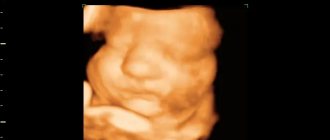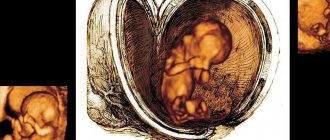Baby movements at 26 weeks
The twenty-sixth week of pregnancy is a time when the baby sleeps most of the day.
The rest period is a maximum of 18 to 21 hours. The rest of the time the fetus is awake and signals this with regular tremors. The baby has grown so much that with the help of movements he can signal his mother about his positive and sometimes negative emotions. Even the child's father and other household members can feel this by placing their hand on the belly of a pregnant woman. Doctors recommend that mothers and fathers monitor the frequency and intensity of the child’s movements every day. Too active or too weak tremors may be a reason for additional examination to make sure that the fetal vital signs are normal.
Interesting Facts
| Options | Indications |
| Time from conception | 24 weeks |
| Period by month | 26 weeks |
| What month | 6 |
| Dimensions and weight of the fetus | 350 mm, 760 g |
| Uterus dimensions | At the middle of the distance between the navel and the xiphoid process, IMD - 23-26 cm |
| Pregnant weight | Gain from the beginning of pregnancy is 7-10 kg; over the last week no more than 400-500 g |
Your baby is the size of
Cantaloupe Melon
350mm Size
760 g Weight
At this stage, you probably regularly feel fetal movements and can even see them. These are amazing sensations that fill the expectant mother with peace and love. The baby is actively growing, you are gaining weight and therefore may feel uncomfortable. A duck's gait, smoothness in movements and some clumsiness appear. This week your unborn baby will open his eyes for the first time. They are already able to discern light through the abdominal wall. What else is important and you need to know about the 26th week of pregnancy?
Good to know
Hemorrhoids - a secret disease of pregnant women
Full immersion: the benefits of swimming for pregnant women
Sun, sea and... pregnancy
We relieve increased uterine tone without medications
Pregnancy and beauty: taking care of your face and body
Communication problems. Fetoplacental insufficiency
"Oxygen starvation." What is fetal hypoxia?
Traveling during pregnancy: preparation, insurance, package of documents
Traveling during pregnancy
All texts for pages about mother and baby were kindly provided by RAMA Publishing - these are chapters from the book by Svetlana Klaas “Your Favorite Little Man from Conception to Birth”, reviewer Irina Nikolaevna Kononova, Candidate of Medical Sciences, Associate Professor of the Department of Obstetrics and Gynecology of the Ural State Medical Academy (Ekaterinburg).
Feelings of the expectant mother
At 26 weeks of pregnancy, the normal weight gain is 7 kg. The fundus of the uterus is located 6 cm above the navel. It puts more and more pressure on the diaphragm, making breathing difficult. For the same reason, a woman feels heartburn.
The body experiences a double load, so you may often feel drowsiness, fatigue and weakness. Take care of yourself, try to get enough sleep and rest during the day. Maternity leave is coming soon, and it will be easier to do this.
A mucus plug forms in the cervix, the function of which is to protect against infections. Vaginal discharge may become heavier. Normally, they should be light, have a uniform consistency and a neutral odor. Curdled or purulent discharge is an urgent reason to consult a doctor.
Many women experience what is called “nesting syndrome.” I want to decorate my home, change the curtains and buy everything I need for the birth of my baby. This is a natural state established by nature. At this time, it is important to protect the expectant mother from emotional and physical stress.
Recommendations
- A pregnant woman needs to provide herself with adequate rest. She needs to get enough sleep and be able to lie down for some time during the day. This is necessary so that the body can recover from the load, which is increasing.
- To make bearing a baby easier, you should talk to a gynecologist about using a bandage. Start wearing it if there are no contraindications. This will help redistribute the load on your back.
- Choose a position that is comfortable for sleeping. Pregnant women are not recommended to sleep on their back, as the blood vessels are compressed. The best option is to sleep on your side. Place pillows under your stomach and back to make the position more comfortable.
- Proper nutrition. Everything that enters the body of a pregnant woman, one way or another, also reaches the baby. Therefore, there is no need to abuse junk food. By eliminating fried, smoked and sweet foods and increasing the amount of protein and fiber, a woman will ensure a complete supply of nutrients. In the second trimester, pregnant women have an excellent appetite, so you need to monitor your diet during this period especially carefully. And, of course, you need to provide yourself with enough fluid through water, tea, fruit drinks and compotes.
- Exercise stress. An active lifestyle provides the body of the expectant mother and her baby with oxygen, which is important for the full development of the baby. The main thing is not to overdo it, so as not to cause an increase in the tone of the uterine muscles.
- If you are at risk of miscarriage, it is better to refrain from intimacy with your partner so as not to cause premature labor. But if the pregnancy is going well, you can fully enjoy your sex life.
- Avoid conflict situations and stress, because this affects not only your mood, but also the condition of the baby. Spend as much time as possible in a calm environment, read aloud and sing, because your baby can hear you.
Baby development
The changes that occurred with the baby during the 2nd trimester of pregnancy are impressive:
- internal organs are formed;
- facial features appeared;
- he hears well and knows how to distinguish taste;
- his movements are coordinated;
- a daily routine appeared, including periods of sleep and wakefulness.
The average weight of a baby at 26 weeks of pregnancy is 760 grams. The amount of subcutaneous fat is rapidly increasing, thanks to which the child no longer looks thin, as it did just a couple of weeks ago. The average height is 35 cm. The skeletal system continues to strengthen, so the baby now needs calcium. Don't forget to consume fermented milk products rich in it.
The brain and central nervous system develop, memory is formed. The baby remembers, first of all, his mother’s voice and can distinguish it from all the others. The fetal heart rate is 130-160 beats per minute.
Weight
Most women by the 26th week of pregnancy gain from 6.5 to 10 kg of weight from the moment of registration. In some cases, it is possible to deviate from these indicators to a lesser or greater extent without pathological phenomena. A doctor should assess weight and decide on the need for a diet, dietary adjustments or treatment. Based on tests, medical history, well-being, body mass index before pregnancy, the gynecologist can determine how much weight gained corresponds to the period and whether the deviation from the standards is a pathological condition.
Over the next 7 days, it is recommended to gain no more than 500 g.
Tests and ultrasound
At 26 weeks of pregnancy, you may have a scheduled appointment with a gynecologist. Prepare for it by taking a general urine test 1-2 days in advance and writing down all your questions to the doctor in advance. The list will help you not to get confused or forget something important.
At the end of the 2nd trimester, you must take a general blood test, which will determine your hemoglobin level. This is important for the timely diagnosis of anemia, which leads to fetal hypoxia. Another important study is a biochemical blood test. An important indicator here is blood sugar level. It allows you to identify diabetes in pregnant women and adjust your diet if necessary.
Scheduled ultrasound is not performed during this period, only for special indications.
The benefits of rest for a pregnant woman and baby
What will be harmful or unpleasant for the Baby during his mother’s vacation:
- Pressure changes during flight cause hypoxia, or lack of oxygen, in the Baby’s body. The first and last months before birth are the most vulnerable. Your doctor will be your best advisor, and if he doubts the advisability of traveling by plane, it is better to come up with another way to get to your vacation destination;
- sudden climate change: adaptation is stress for any organism, especially for you, and therefore for your Baby;
- vaccinations that are required for travel to the tropics and subtropics. Any vaccine is an infection of the body (including Baby’s tiny body), which takes a lot of effort to fight, and the result is not always guaranteed. Is it worth the risk?
- features of the mother’s condition (health, gestational age), due to which the Baby may be born in another country. Even if there is decent medical care, if the insurance provides quality care for mom and Baby and a subsequent safe flight back home, if you know the language of the country where you are, and you have enough funds for any unforeseen circumstances, you are still exposing the Baby to additional stress . In addition, having become a citizen of another country, the Kid may fall under the protection of local legislation, and it will take some effort for both of you to return to your homeland. (Sometimes such situations drag on for more than a month; it happens that the Baby is away from his mother all this time, in specialized institutions, with strangers.);
- extreme sports (mountaineering, kayaking, parachuting, horseback riding, etc.) are risky for the mother’s life, and therefore for the Baby’s life;
- dehydration - we are talking not only about countries or areas with a dry and hot climate, but also about long journeys or flights (it is known that during a flight the body loses more fluid than under normal conditions). If water-salt metabolism is disrupted, the concentration of salts in the Baby’s blood and amniotic fluid increases significantly, the load on the kidneys increases, and the baby’s body begins a program of fluid accumulation in the tissues. This affects both the physical and emotional state of the Baby. The solution is to always have a supply of drinking water without gases with you - at least 1 liter;
- your experiments with food. Your Baby is quite conservative and may become capricious if you change his gastronomic preferences too sharply. This is especially true in the last trimester, when the Baby’s taste preferences are being formed very actively. An upset stomach before birth is not typical for children, but the baby will definitely react to new taste sensations when swallowing amniotic fluid. And if he doesn’t like the taste, he will wince and spit it out.
Possible complications
Modern medicine makes it possible to maintain pregnancy in case of most complications. It is only important to seek help in time and regularly see your doctor. Be attentive to your condition and do not wait for your health to worsen.
Isthmic-cervical insufficiency
Normally, the cervix dilates only during childbirth. But in some women, due to tissue weakness, the cervix opens long before childbirth. The condition is usually asymptomatic and discovered during a routine examination. Occasionally, a pregnant woman may complain of minor spotting.
Premature dilatation is treated surgically - sutures are placed on the neck or a pessary is installed. This is a special ring-shaped device that prevents the internal opening from opening. The woman is recommended to wear a bandage, and maintenance hormonal therapy is prescribed according to indications.
Survey
Pregnancy with twins is confirmed using ultrasound examination already at 5-7 weeks of gestation. Fraternal fruits are usually identified earlier than identical fruits. Doctors should warn the couple that it is extremely rare, but still there is a phenomenon called hidden twin syndrome (ischiopagus) - one more developed embryo absorbs the other. Then, during the following diagnostic procedures, a singleton pregnancy is displayed on the ultrasound monitor screens. Also, with incomplete separation, it is possible for twin organisms to join each other (Siamese twins). Modern diagnostic methods make it possible to establish as accurately as possible the fact of twin pregnancy. But the expectant mother should be aware of the risks associated with such a gestation. Thanks to the Doppler system that studies blood flow, an experienced diagnostician can determine the beating of two hearts at once.
A blood test shows an elevated level of an embryo-specific marker - alpha-fetoprotein (AFP), and a reduced iron concentration. Chorionic gonadotropin is higher during pregnancy with twins, and sharp jumps are observed. If a test system is used to determine pregnancy, then due to the concentrated hCG, the control strip will be richer in color. A medical examination and measurements of the uterine fundus show significant expansion of the uterus, which is not typical for normal pregnancy. An obstetrician-gynecologist can palpate two heads.
Do's and Don'ts
The twenty-sixth week of pregnancy is usually easy and comfortable. We recommend that you exercise regularly during this period. Physical activity saturates tissues with oxygen, strengthens muscles and makes it easier to endure the difficulties of pregnancy. Yoga, swimming, special exercises for pregnant women or just walking - choose the activity that is optimal for you and don’t be lazy. You will feel how grateful your body will be to you.
If the pregnancy proceeds without complications, do not deny yourself physical intimacy with your partner. Choose positions without pressure on the stomach and deep penetration.
Do not take medications without a doctor’s prescription, even if this is the only way you have been treated all your life. Many usual means of treating even a simple cold are prohibited during pregnancy, as they can negatively affect the condition of the fetus.
You are also prohibited from such medical procedures as x-rays of the abdominal cavity and chest, computed tomography and fluorography.
Mother. Changes in the body's condition at 26 weeks
Mom's health at 26 weeks of pregnancy
At week 26, most expectant mothers begin to understand what the word “pregnancy” means. Coming from the word “burden,” this interesting situation this week is accompanied not only by the growth of the belly and the baby’s kicks. Many expectant mothers no longer see their legs while walking, they feel how quickly fatigue and weakness sets in, and their drowsiness increases.
Increasingly, loved ones note how a woman becomes distracted and forgetful, and the pregnant woman herself often does not want to do work related to mental labor. It’s worth getting ready, maternity leave is just around the corner. You can now begin to collect the necessary documents and prepare to transfer cases to other employees.
I want more and more to prepare for the reception of a newborn, think through the design of a room or a look for discharge, clean all the corners in the house or paint the walls. This is how the “nesting syndrome” manifests itself. The subconscious of the expectant mother prepares her for the upcoming meeting. There is no need to prohibit yourself from doing pleasant little things, but do not forget that it is advisable to refrain from lifting heavy objects and contact with chemicals.
This week, a woman may experience some sensations and changes in the state of her body, bringing inconvenience and difficulty. Most often, pregnant women complain of:
- difficulty breathing: shortness of breath, a feeling of constriction in the lungs, inability to take a deep breath. Added to these sensations are the jolts of the baby lying upside down, causing unpleasant sensations in the diaphragm. This is a normal state of affairs, which will be observed almost until the birth itself. The uterus compresses all surrounding organs, causing the indicated sensations. It will become easier closer to childbirth, when the baby begins to take the position for birth, the stomach begins to drop lower;
- frequent urination . Quite often, pregnant women complain of a constant feeling of incomplete emptying of the bladder. At this stage, he experiences strong pressure from the uterus, and more frequent trips to the toilet are quite normal. Consultations with a gynecologist require: pain or burning in the perineum during urination;
- the appearance of urinary incontinence;
- dark or cloudy urine color.
- providing fractional meals: 5-6 times a day in small portions;
- they do not go away after rest;
These symptoms occur very often, but not in all pregnant women. You shouldn’t look for complications and get upset ahead of time. If you have questions about your health, a woman is recommended to consult a gynecologist, avoiding excessive anxiety.
Movements
At the 26th week of pregnancy, a woman should normally feel the movements of the fetus in the uterus every day. They can be weak or strong, localized in the hypochondrium or lower abdomen. It's a good idea to start counting the number of movements you feel per day. It is considered ideal if a pregnant woman feels up to 10 tremors of varying intensity in 12 hours. If the fetus begins to move much more actively, or the expectant mother does not feel its movements within 12 hours, you need to consult a gynecologist for advice.
Checklist for 26 weeks of pregnancy
- Do not stay in one position for a long time, take breaks from work and do not lift weights exceeding 3-5 kg.
- Warm baths, exercises on a fitball and swimming will help relieve discomfort in the lower back.
- Watch for symptoms such as facial swelling, severe headaches, sensitivity to light, nausea, and sudden weight gain of more than 2 kg per week. These are possible signs of preeclampsia. Urgent medical attention is required.
The specialists of the Women's Medical Center will help you not to miss the development of possible complications during pregnancy. You can contact your doctor at any time and receive qualified assistance.
Predisposition factors
The occurrence of twin pregnancy can be facilitated by:
- heredity - the presence of twins in relatives of partners or one of them. More common across generations. Moreover, the relatives may not be close - first cousins or second cousins;
- during pregnancy occurring after 35 years of age - the older the woman giving birth, the higher the chances;
- at the end of taking COCs, the ovaries begin to actively produce hormones, which is why several zygotes can form;
- hormonal stimulation during IVF - more than one artificially grown embryo is transported into the uterus. If two eggs are detected during pregnancy, then one can be removed if desired (resorption);
- history of several births. According to statistics, during the fourth pregnancy, every third woman in labor is diagnosed with multiple births (the so-called parity of pregnancy).
Features of obstetrics
In half of the cases, births with twin pregnancies occur prematurely, approximately 3-6 weeks earlier than the expected date. There is no need to worry about this. At this intrauterine age, children are mature, ready for life outside the womb, and adapt normally to the external environment. The average birth date is 35-36 weeks, very rarely mothers reach 38-40 weeks. Pregnant women with twins require early hospitalization, at least 14 days in advance. Children born prematurely require intensive care and professional care. The method of delivery is chosen by the obstetrician depending on the presentation, the amount of amniotic fluid, and possible hypoxia.
Expert opinion of a doctor
Andamova Elena Viktorovna
Obstetrician-gynecologist, Ph.D.
70% of two pregnancies end in caesarean section. It is indicated in the pelvic or transverse position. Sometimes the doctor decides to perform surgery to avoid existing risks. Unforeseen consequences can occur even with a normal pregnancy and correct presentation. If a woman has already had a cesarean section before, some gynecologists argue that pregnancy with twins can pose a danger to life or health. But practice does not confirm this opinion.
During pregnancy with twins, giving birth on your own is allowed if the gestation proceeded satisfactorily, the woman in labor is healthy, the onset of labor is regular, and both babies have a cephalic presentation.











